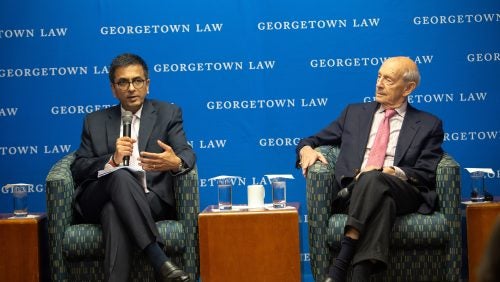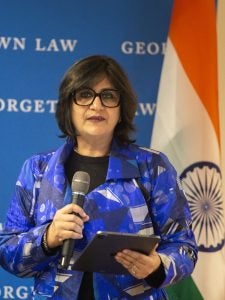Two Supreme Court Justices Compare Constitutions
November 3, 2023

Chief Justice Chandrachud and former Justice Breyer
Discussing a wide range of issues, from deliberations on same-sex marriage to grad school memories, Chief Justice of India Dhananjanaya Yeshwant Chandrachud and recently retired U.S. Supreme Court Justice Stephen Breyer met for the fourth “Comparative Constitutional Law Conversation” at Georgetown Law on October 23.
The series is a joint project between the Law Center and the Society for Democratic Rights, an Indian organization dedicated to strengthening democratic and civil rights and founded by two Georgetown Law alumni. Previous conversations had all taken place as Zoom webinars, but this year, Supreme Court justices from the world’s two largest democracies were able to talk face-to-face before a standing-room-only audience in the Gewirz Student Center.
DIVERGENT OUTCOMES
Since the conversation took place only a week after the Indian Supreme Court ruled against legalizing same-sex marriage, moderator Dean William M. Treanor steered the discussion toward the topic, referencing the Indian Court’s recent decision as well as the U.S. Supreme Court’s 2015 Obergefell v. Hodges ruling legalizing same-sex marriages throughout the country. Treanor asked each of the justices to provide some insight into the internal judicial debates and larger contexts that had led to divergent outcomes on this issue.
Breyer traced his reasoning back to the Equal Protection clause of the Fourteenth Amendment, and other major civil rights issues such as school desegregation, which led him to conclude that the importance of the right to marriage outweighed opponents’ arguments such as the potential harm to religious practice. He said that most judges would not know for decades to come what impact their decisions would have, so his best advice was to strive for “sound” opinions.
‘The job of the judge is: go back, look at the history, look at the words, look at the consequences, look at the values that underlie the words that are written in the Constitution – and then, I don’t want to say guess, but I do want to say there is a thing called judicial instinct,” said Breyer, explaining his approach to his work on the Court.
Breyer also entertained the audience with anecdotes about his discussions with his late colleague “Nino” (Justice Antonin Scalia) about originalist interpretation of the Constitution: “If he were here, we’d get into a major debate and he’d say, ‘What are you doing, Breyer? This is ridiculous!’ I’d say, ‘Of course you have to interpret the Constitution so the rights within it change as circumstances change… George Washington didn’t know about the Internet!’ and he would say, ‘I knew that.’”
For his part, Chandrachud explained that he and his colleagues had ultimately decided that the issue of same-sex marriage was something that should be enshrined into law by the legislature, not ordered through judicial opinion. He further explained his thinking on the role courts play in India.
“[Courts] don’t take upon ourselves the role of the legislature, we don’t take upon ourselves the role of the executive,” he said. “We are becoming areas where people come in order to give vent to their expression for a society which they aspire to achieve, whether it’s in the area of human rights, of climate change, of social welfare… Courts have a very vital role to play in that sense, in steadying the ship when so much is happening all around our societies.”
LESSONS LEARNED ABROAD

Vibha Datta Makhija, L’92, Senior Advocate at the Supreme Court of India and cofounder of the Society for Democratic Rights, introduced the event’s speakers.
The jurists also talked about something the international students in the room could relate to – the experience each had had studying overseas. Chandrachud, who earned an LL.M. and S.J.D. in the 1980s at Harvard Law School, said his years at Harvard were “not just informative, but formative.” He added that his dissertation research, which focused on affirmative action, has continued to reverberate throughout his career.
“The benefit of education is something which you realize in layers as you progress through life,” said Chandrachud. “The benefit which I received when I was a student is very different from when I became a lawyer, so some of these ideas continue to shape the work which I continue to do.”
Chandrachud mentioned that he’d had the chance to audit lectures by Breyer, who was a Harvard Law professor at the time (and has since returned to the faculty), and that they were “simply amazing.”
Breyer then reminisced about studying Jurisprudence at Oxford as a Rhodes Scholar in 1959-61. “It stood me in good stead – particularly the economics and the philosophy,” he said.
Ever the professor, Breyer counseled the students present to develop their own approaches to the law and to stay open to debate with those who have opposing viewpoints.
“I hope in two or three years, by the time you’re out of here, you won’t have a definite answer, but you will have an informed way of criticizing or praising the decisions that are written by the courts and the advice that is given by the lawyers,” he said.
Watch the entire event: